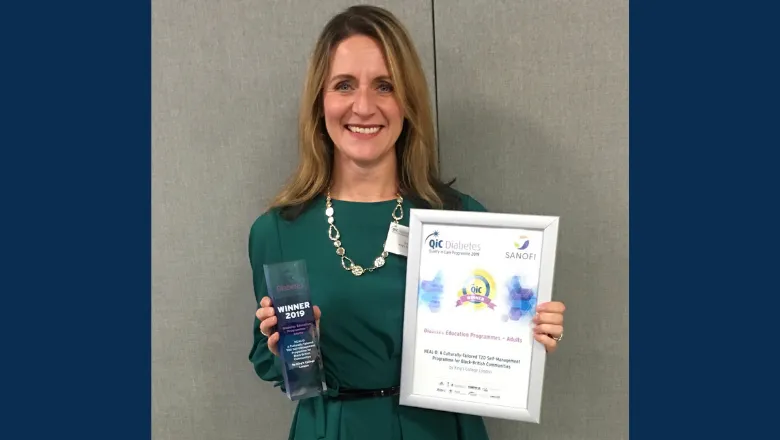Tackling ethnic inequalities in type 2 diabetes is an urgent healthcare priority in the UK. To address this, we worked with local Black African and Caribbean communities and healthcare providers in South London to develop this programme. Seeing the positive impact HEAL-D has had on people living with diabetes has been a hugely rewarding experience. We're even more pleased that, as a result of HEAL-D being commissioned in South London, this research will now reach more people living with diabetes. We're delighted that the impact of our work has been recognised through the Diabetes Quality in Care Award.
Dr Louise Goff
23 October 2019
King's wins at prestigious national diabetes awards
A programme that addresses poorer diabetes-related outcomes in Black African and Caribbean patients was recognised at the Quality in Care Diabetes Awards last week.

The programme titled ‘Healthy Eating & Active Lifestyles for Diabetes’ (HEAL-D) is a Type 2 diabetes self-management programme, culturally tailored to meet the needs of Black African and Caribbean patients. HEAL-D, led by Dr Louise Goff, School of Life Course Sciences and funded by the NIHR, was developed using methods to ensure its cultural relevance and acceptability. It has been evaluated in a pilot study in primary care, showing significant improvements in patient quality of life resulting in south London commissioners adopting it for wider implementation.
The initiative won in the Diabetes Adult Education Programmes category at the 2019 Quality in Care Diabetes Awards, which were held on Thursday 17 October at Sanofi UK headquarters.
This category recognises initiatives that educate and empower people with diabetes and/or their families and carers to self-manage and stay as healthy as possible.
The Judges of the award said “This entry went far and above what is needed and carved a significant area of benefit within a problem area for education programmes that is so often forgotten about. The judges admired that those involved actively went out into different communities and encouraged involvement where there otherwise may have been none. The idea is not only innovative but transferrable to other areas of the UK and could even be used for different conditions. The entry laid out a clear plan and achieved what it set out to do: break the barriers of diabetes education, and make knowledge for people with diabetes completely accessible.”
